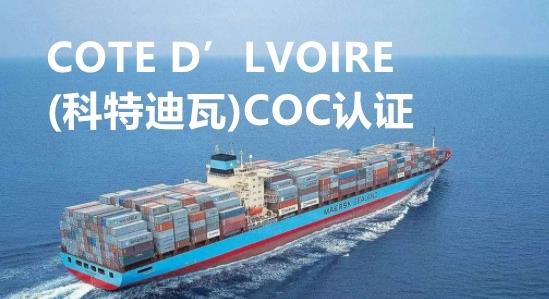Cote d'Ivoire COC certification
Côte d'Ivoire is one of the important economies in West Africa, and its import and export trade plays a key role in its economic growth and development. The following are some basic characteristics and related information about Côte d'Ivoire's import and export trade:

Import:
• Côte d'Ivoire's imported goods mainly cover daily consumer goods, machinery and equipment, automobiles and accessories, petroleum products, construction materials, packaging materials, electronic products, food (such as rice) and other industrial raw materials.
• As the Ivorian government is committed to promoting industrialization and improving infrastructure, there is a greater demand for imports of industrial machinery, equipment and technology.
• In addition, due to limited production capacity in some domestic industries, daily necessities and high value-added commodities also rely heavily on imports.

• Côte d'Ivoire's export commodities are diverse, mainly including agricultural products such as cocoa beans (it is one of the largest cocoa producers in the world), coffee, cashew nuts, cotton, etc.; in addition, there are also natural resource products such as timber, palm oil, and rubber.
• In recent years, the Côte d'Ivoire government has promoted industrial upgrading and encouraged the export of processed products, resulting in an increase in the export proportion of processed products (such as primarily processed agricultural products).
• In addition to primary products, Côte d'Ivoire also strives to develop mineral resources and energy exports, but the current proportion of mining and energy exports in total exports is still small compared with agricultural products.
Trade Policies and Procedures:
• Côte d'Ivoire has taken several steps to promote international trade, including joining the World Trade Organization (WTO) and entering into free trade agreements with other countries.
• Foreign goods exported to Côte d'Ivoire need to comply with a series of import regulations, such as product certification (such as COC certification), certificate of origin, sanitary and phytosanitary certificates, etc.
• Similarly, Côte d'Ivoire exporters also need to comply with the regulatory requirements of the importing country, such as applying for various international certifications, certificates of origin, etc., as well as meeting specific food safety and product quality standards.

Logistics and customs clearance:
• The transportation and customs clearance process includes selecting the appropriate transportation method (such as sea, air or land transportation) and processing the necessary documents, such as bill of lading, commercial invoice, certificate of origin, COC certificate, etc.
• When exporting dangerous goods or special commodities to Côte d'Ivoire, additional compliance with international and Côte d'Ivoire's own dangerous goods transportation and management regulations is required.
To sum up, Côte d’Ivoire’s import and export trade activities are jointly affected by international market demand, domestic policy orientation, and international regulations and standards. When companies engage in trade with Côte d’Ivoire, they need to pay close attention to relevant policy changes and compliance requirements.
Côte d'Ivoire COC (Certificate of Conformity) certification is a compulsory import certification applicable to products exported to the Republic of Côte d'Ivoire. The purpose is to ensure that imported products comply with Côte d'Ivoire's domestic technical regulations, standards and other relevant requirements. The following is a summary of the key points regarding COC certification in Côte d’Ivoire:
• According to the regulations of the Ministry of Commerce and Trade Promotion of Côte d'Ivoire, from a certain time (the specific implementation date may be updated, please check the latest official announcement), products in the import control catalog must be accompanied by a product conformity certificate when clearing customs (COC).
• The COC certification process generally includes:
• Document review: Exporters need to submit documents such as packing lists, proforma invoices, product test reports, etc. to an accredited third-party agency for review.
• Pre-shipment inspection: On-site inspection of products to be exported, including but not limited to quantity, product packaging, shipping mark identification, and whether they are consistent with the description in the provided documents, etc.
• Issuance of certificate: After completing the above steps and confirming that the product meets the standards, the certification body will issue a COC certificate for customs clearance at the destination port.
• There may be different certification pathways for different types of exporters or producers:
• Path A: Suitable for merchants who export infrequently. Submit documents once and obtain the COC certificate directly after inspection.
• Path B: Suitable for merchants who frequently export and have a quality management system. They can apply for registration and conduct regular inspections during the validity period. This will simplify the process of obtaining COC for subsequent exports.
• If a valid COC certificate is not obtained, imported products may be refused clearance or subject to high fines at Côte d'Ivoire customs.
Therefore, companies planning to export to Cote d'Ivoire should apply for COC certification in advance in accordance with relevant regulations before sending out the goods to ensure smooth customs clearance of the products. During the implementation process, it is recommended to pay close attention to the latest requirements and guidelines issued by the Government of Côte d'Ivoire and its designated agencies.


